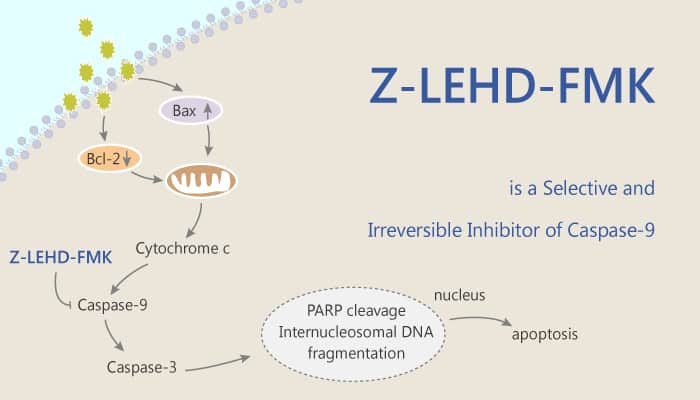TRAIL is a potent inducer of apoptosis of transformed and cancer cells but not of most normal cells. TRAIL induces apoptotic death on binding to either of two proapoptotic TRAIL receptors, TRAIL R1 or TRAIL R2. Moreover, normal cells may resistant to TRAIL because of expressing higher levels of TRAIL decoy receptors TRID (DcR1) or TRUNDD (DcR2) on their cell surface. TRAIL (APO2L) is a promising agent for development as cancer therapeutics. However, there are not all cancer cells sensitive to TRAIL. There are a number of TRAIL-resistance mechanisms in cancer cells including low or undetectable expression of DR4, high expression of FLIP, or loss of caspase 8 expressions. In this study, the author found that normal human liver cells could be protected from TRAIL-induced apoptosis by simultaneous exposure to Z-LEHD-FMK. Similar brief exposure to TRAIL plus Z-LEHD-FMK inhibited colony growth of SW480 but not HCT116 cells.
Z-LEHD-FMK is a selective and irreversible inhibitor of caspase-9. It protects against lethal reperfusion injury and attenuates apoptosis. Meanwhile, Z-LEHD-FMK can protect some human cancer cell lines from TRAIL-induced apoptosis. Furthermore, brief Exposure to Z-LEHD-FMK can protect HCT116 but not SW480 colon cancer cells from TRAIL-induced apoptosis in a colony assay. In addition, Z-LEHD-FMK protects neurons, glia, myelin, axons, and intracellular organelles in spinal cord injury (SCI) rats.

In summary, Z-LEHD-FMK is an irreversible, selective caspase-9 inhibitor with antiapoptotic properties. Z-LEHD-FMK protects human liver cells while permitting the death of cancer cells exposed to tumor necrosis factor-related apoptosis-inducing ligand. Thus, this study suggests a novel strategy using the combination of the caspase 9 inhibitor, Z-LEHD-FMK, and TRAIL in an effort to maintain the killing effect of many cancer cell types while offering some degree of protection to the human liver.
Reference:
Ozoren N, et, al. Cancer Res. 2000 Nov 15; 60(22): 6259-65.